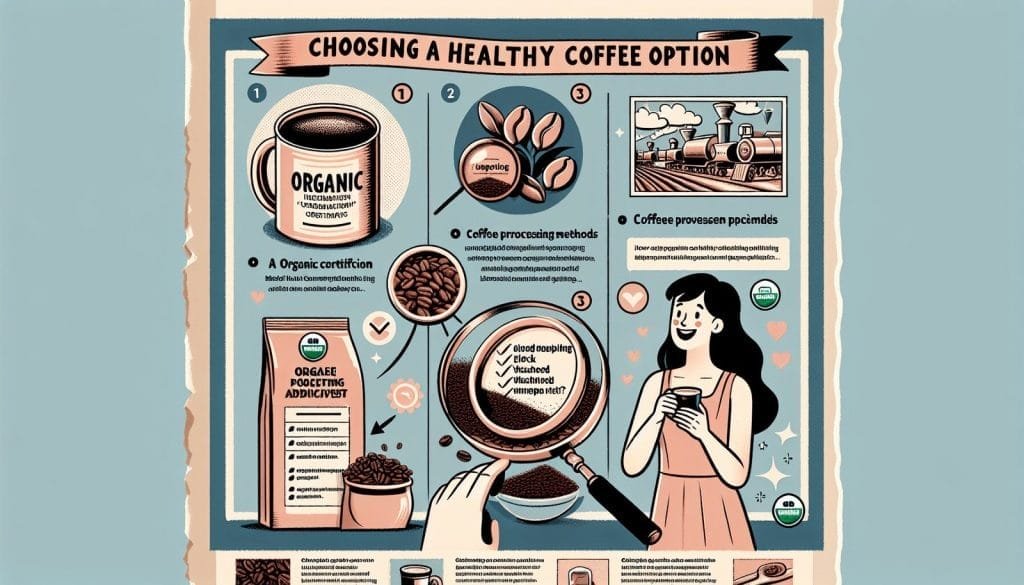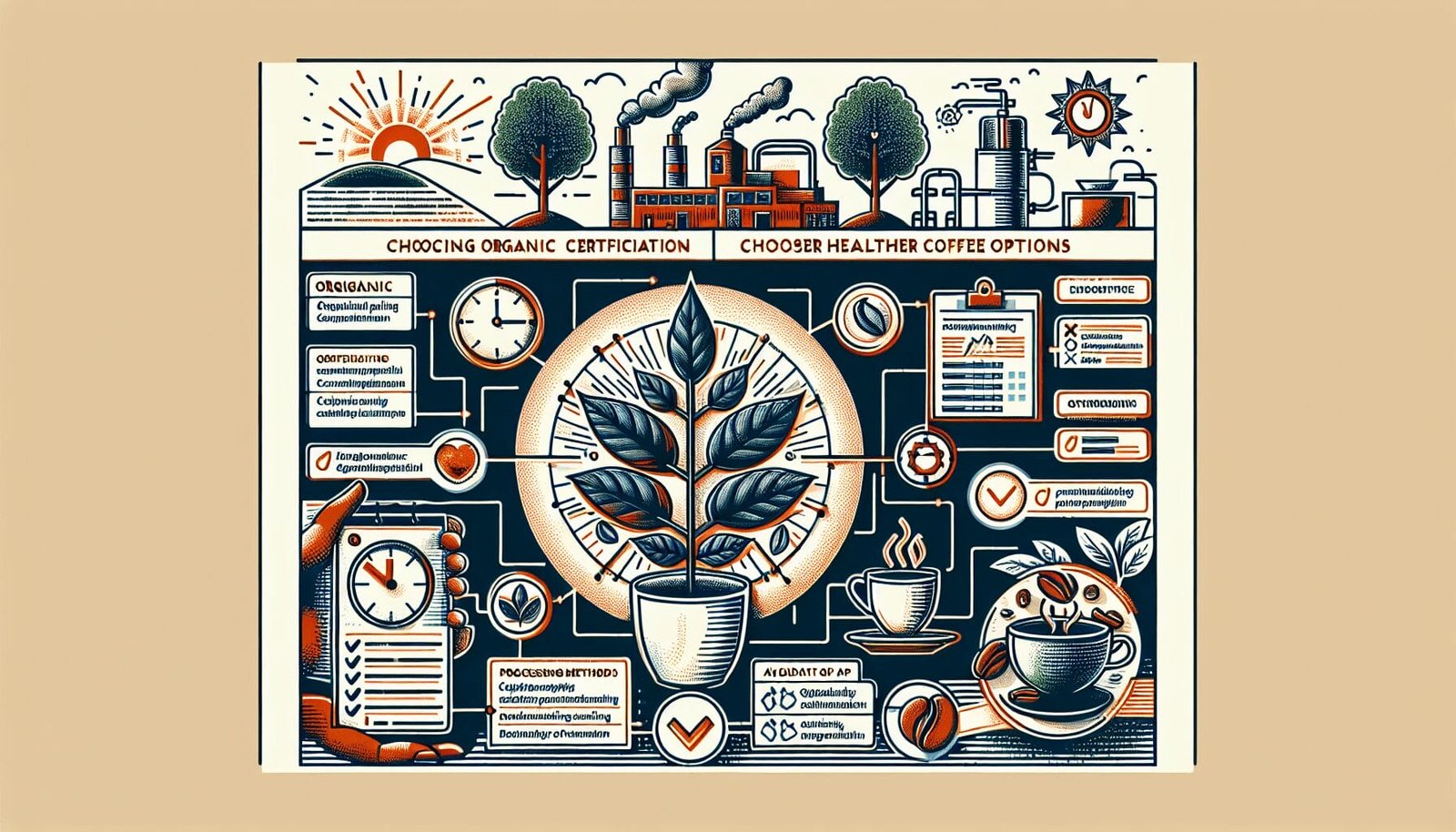When it comes to choosing a healthy coffee, the options can seem endless and overwhelming. You want a beverage that not only provides a boost of energy, but also supports your overall well-being. But fear not, because in this article, you will discover a simple yet effective guide to help you navigate the world of coffee and make a choice that will leave both your taste buds and your body feeling satisfied. So, grab your mug, sit back, and get ready to embark on a coffee journey like no other.

Understanding the Basics of Coffee
Different types of coffee beans
Coffee beans come in a variety of types, each offering a unique flavor profile. The two most popular types are Arabica and Robusta. Arabica beans are known for their delicate and nuanced flavors, making them the preferred choice for specialty coffees. On the other hand, Robusta beans have a stronger and more bitter taste, making them popular for espresso blends. It’s important to note that the type of beans used can greatly impact the overall taste and quality of your coffee experience.
The process of coffee production
Coffee production involves several stages, starting from the cultivation of coffee plants, harvesting the cherries, processing the cherries to obtain the coffee beans, and finally roasting and brewing the beans. The process begins with the careful selection and planting of coffee trees in suitable climates and altitudes. Once the cherries are ripe, they are harvested either by hand or machine. The cherries are then processed to remove the outer layer, revealing the coffee beans inside. The beans are then dried, sorted, and roasted to bring out their unique flavors. Finally, the beans are ground and brewed to create a delightful cup of coffee.
Health benefits of drinking coffee
While coffee is often criticized for its potential negative effects, it also offers numerous health benefits. Coffee is a rich source of antioxidants, which can help protect the body against oxidative stress and inflammation. It has also been associated with a lower risk of certain chronic diseases, such as Parkinson’s disease, type 2 diabetes, and liver disease. Additionally, coffee contains caffeine, which can improve alertness, cognitive function, and physical performance. However, it is important to consume coffee in moderation and be mindful of individual sensitivities and health conditions.
Common Health Concerns with Coffee Consumption
Caffeine addiction and withdrawal
One of the most common concerns with coffee consumption is the risk of caffeine addiction and withdrawal symptoms. Caffeine is a stimulant that can lead to dependence when consumed regularly in high amounts. If you rely on coffee to stay energized and experience withdrawal symptoms such as headaches, fatigue, and irritability when you try to cut back or quit, you may be experiencing caffeine addiction. To mitigate the risk, it’s important to monitor your caffeine intake and consider tapering down gradually if needed.
Effects on sleep cycle
Another concern associated with coffee consumption is its potential disruption of sleep. The stimulating effects of caffeine can make it difficult to fall asleep and may also interfere with the quality of your sleep. It is recommended to avoid consuming caffeine at least six hours before bedtime to allow your body enough time to metabolize it. Additionally, paying attention to your individual caffeine sensitivity and adjusting your intake accordingly can help ensure a good night’s sleep.
Digestive issues due to coffee
Coffee has been known to cause digestive issues in some individuals. The acidity of coffee can irritate the stomach lining and lead to symptoms such as heartburn, acid reflux, and indigestion. If you experience these issues, switching to a low acid coffee or opting for alternative brewing methods, such as cold brew or using a coffee maker with a built-in acid reducer, may help alleviate digestive discomfort.
Impact on heart and blood pressure
High coffee consumption, especially when combined with other risk factors such as smoking or a poor diet, may have an impact on heart health and blood pressure. While moderate coffee intake has not been definitively linked to increased risk, excessive consumption may lead to elevated blood pressure levels and an increased risk of heart disease. If you have preexisting heart conditions or concerns regarding your blood pressure, it’s advisable to consult with your healthcare provider about the appropriate amount of coffee for your individual situation.
The Nutrition Facts of Coffee
Caloric content of coffee
Coffee is a low-calorie beverage, typically containing only a few calories per cup. However, the addition of cream, sugar, flavored syrup, or other accompaniments can significantly increase the caloric content. If you’re watching your calorie intake, opting for black coffee or using minimal additions can help keep the overall calorie count in check.
Vitamins and minerals in coffee
While coffee is not a significant source of vitamins and minerals, it does contain small amounts of certain nutrients. These include riboflavin (vitamin B2), pantothenic acid (vitamin B5), manganese, potassium, and magnesium. However, the amounts are generally not sufficient to meet daily recommended intake levels. Coffee should not be relied upon as a sole source of nutrition but can contribute to overall nutrient intake when consumed as part of a balanced diet.
Antioxidants in coffee
One of the key health benefits of coffee is its rich antioxidant content. Antioxidants help protect the body against damage from free radicals, which are unstable molecules that can contribute to the development of chronic diseases and aging. Coffee contains various antioxidants, including chlorogenic acids, quinides, and tocopherols. The roasting process of coffee beans can affect the antioxidant content, with darker roasts generally having lower antioxidant levels than lighter roasts.
Picking Organic Coffee
How organic coffee is grown
organic coffee is grown without the use of synthetic fertilizers, pesticides, herbicides, or genetically modified organisms (GMOs). Instead, organic farmers rely on natural methods of pest control, soil enrichment, and crop rotation to maintain the health and sustainability of their coffee plantations. This approach helps minimize environmental impact, protect biodiversity, and support the well-being of farmers and local communities.
Why choose organic over conventional
Choosing organic coffee not only benefits the environment but also promotes your own health. By avoiding the use of harmful chemicals and artificial additives, organic coffee reduces your exposure to potentially harmful substances. Additionally, organic farming practices prioritize soil health, which can lead to better-tasting coffee with more complex flavors. Supporting organic coffee also contributes to sustainable agriculture and encourages responsible practices in the coffee industry.
Finding certified organic coffee
To ensure that the coffee you purchase is truly organic, look for certifications from reputable organizations such as the United States Department of Agriculture (USDA) or the European Union’s Organic Certification. These certifications indicate that the coffee meets strict standards for organic production and has undergone regular testing and inspections. Many coffee brands prominently display these certifications on their packaging, making it easier for consumers to make informed choices.
Price comparison of organic and conventional coffee
It’s worth noting that organic coffee tends to be slightly more expensive than conventional coffee. This is due to the additional costs associated with organic farming practices and certification processes. However, the price difference is often justified by the higher quality, environmental benefits, and support for ethical practices. If the cost is a concern, it’s possible to find reasonably priced organic coffee options by comparing different brands and exploring local coffee roasters or online retailers.

Sourcing Fair Trade Coffee
Principles of fair trade coffee
Fair trade coffee is produced with a focus on social and economic justice. The principles of fair trade aim to ensure that coffee farmers receive fair wages, have safe working conditions, and have access to resources and opportunities for development. Fair trade organizations work to empower small-scale farmers, promote sustainable farming practices, and improve the livelihoods of coffee-growing communities around the world.
Benefits of choosing fair trade
By choosing fair trade coffee, you are supporting a more equitable and sustainable coffee industry. Fair trade certification guarantees that the farmers behind your coffee are paid fair prices for their products, enabling them to invest in their communities, education, and healthcare. Fair trade also promotes environmental sustainability by encouraging organic farming practices, protecting biodiversity, and reducing the use of harmful chemicals. Additionally, fair trade coffee often prioritizes transparency and traceability, allowing consumers to make informed choices about the products they purchase.
Identifying fair trade coffee brands
Look for fair trade certifications from reputable organizations such as Fairtrade International or the Fair Trade Certified label. These certifications ensure that the coffee has been produced according to fair trade standards. Many coffee brands proudly display these certifications on their packaging, making it easier for consumers to support fair trade practices. Additionally, consider exploring local coffee shops or cooperatives that prioritize fair trade values and offer a wider range of specialty fair trade coffees.
Choosing Low Acid Coffee
Reasons for switching to low acid coffee
Low acid coffee is a popular choice for individuals who experience digestive issues or have a sensitivity to acidic foods. The acidity in regular coffee can sometimes aggravate conditions such as acid reflux, heartburn, or stomach ulcers. Switching to low acid coffee can help alleviate these symptoms and promote better digestion. Additionally, low acid coffee is often smoother and less bitter in taste, making it a favorable option for those who prefer a milder coffee experience.
Low acid coffee brands in market
Several brands offer low acid coffee options specifically designed for individuals with sensitivities or digestive issues. These coffees are often labeled as “low acid,” “stomach-friendly,” or “easy on the stomach.” Some popular low acid coffee brands include Puroast, Tieman’s Fusion Coffee, and HealthWise Coffee. These brands typically use specific roasting techniques or specialty beans to reduce the acidity levels while maintaining the flavor and aroma of the coffee.
Considering the Process: From Bean to Cup
Roasting process and its effects on health
The roasting process plays a significant role in determining the flavors, aromas, and health effects of coffee. During roasting, the green coffee beans undergo chemical changes that enhance the taste and aroma by breaking down sugars and creating complex compounds. However, high-temperature roasting can also produce compounds that may have potentially negative health effects. Acrylamide, a byproduct of the roasting process, has been linked to certain health risks, including an increased risk of cancer. To minimize these risks, opting for medium or light roast coffees can reduce the levels of acrylamide while still providing delightful flavors.
Best methods of brewing for healthiness
The brewing method can also impact the healthiness of your coffee. Certain brewing methods, such as espresso or French press, result in higher concentrations of certain compounds, including cafestol and kahweol, which can raise cholesterol levels. On the other hand, using paper filters in drip coffee makers or opting for pour-over methods can help remove these compounds, resulting in a healthier cup of coffee. Cold brew coffee, which involves steeping coffee grounds in cold water for an extended period, has also gained popularity for its lower acidity and smoother flavor profile.
Deciding on Flavored Vs Unflavored Coffee
Health implications of flavored coffee
Flavored coffee can be a tempting choice for those looking to add some excitement to their coffee routine. However, it’s important to be aware of the potential health implications of flavored coffee. Many flavored coffees are created using artificial flavorings or sweeteners, which can add unnecessary calories, sugars, and artificial chemicals to your cup. These additives may have negative health effects, particularly for individuals with diabetes, obesity, or other health conditions. It’s advisable to opt for natural flavors or enjoy the natural nuances of coffee without added flavorings.
Natural vs artificial flavors
When it comes to flavored coffee, the source of the flavorings is crucial. Natural flavors are derived from real ingredients like fruits, spices, or extracts, providing a more authentic and wholesome taste. Artificial flavors, on the other hand, are synthetic compounds created in laboratories to mimic specific flavors. While both types can add unique tastes to your coffee, natural flavors are generally considered healthier and more desirable. It’s always a good idea to check the ingredient list or seek out brands that disclose the source and composition of their flavorings.
Choosing the Right Coffee for Specific Diet Regimes
Coffee and Keto diet
The ketogenic diet is a low-carb, high-fat diet that involves minimizing carbohydrate intake and increasing fat consumption. Coffee can be a suitable choice for individuals following the keto diet as it is naturally low in carbs and can provide an energy boost. To stay in ketosis, it’s important to enjoy coffee without added sugars or high-carb milk options. Instead, consider using unsweetened almond or coconut milk and natural sweeteners like stevia or monk fruit.
Coffee and Paleo diet
The paleolithic or Paleo diet focuses on consuming foods that were available to our ancestors during the Paleolithic era. Coffee, in its pure form, is considered paleo-friendly as it is a naturally occurring beverage. However, it’s recommended to avoid adding dairy or artificial sweeteners, which are not part of the traditional paleo diet. Instead, opt for natural sweeteners like honey or enjoy your coffee black.
Coffee and Intermittent Fasting
Intermittent fasting has gained popularity as a dietary approach that cycles between periods of fasting and eating. During the fasting periods, consuming black coffee is generally allowed as it is low in calories and does not break the fast. However, adding cream, sugar, or other calorie-containing additives to your coffee may disrupt the fasting state. It’s best to consult with a healthcare professional or registered dietitian to determine the best approach to coffee consumption while following an intermittent fasting regimen.
Coffee and Veganism
Coffee is inherently vegan-friendly as it is derived from plant-based sources. However, some flavored coffees may contain non-vegan additives such as milk-based flavorings or honey. It’s important to check the ingredient list or seek out vegan-certified coffee brands to ensure that no animal products are used. Many coffee shops and specialty coffee brands now offer a wide array of vegan options, including plant-based milk alternatives, to accommodate the needs of vegan consumers.
Balancing Coffee Consumption with a Healthy Lifestyle
Regulating your daily coffee intake
While coffee can have health benefits, it’s important to consume it in moderation and be mindful of your individual tolerance. The general guideline for healthy adults is to limit coffee intake to 400 milligrams of caffeine per day, which is roughly equivalent to four cups of brewed coffee. It’s also advisable to avoid excessive consumption within a short period, which can lead to caffeine overdose symptoms such as rapid heartbeat, jitteriness, or anxiety. Adjusting your coffee intake based on your individual sensitivity and health condition is key to maintaining a balanced lifestyle.
Combating coffee-induced dehydration
Coffee is often associated with dehydration due to its mild diuretic effect. However, the water content in coffee can still contribute to your overall hydration, especially when consumed in moderation. To counteract any potential dehydration, it’s important to ensure an adequate intake of water throughout the day, especially if you consume larger amounts of coffee or engage in activities that increase fluid loss. Additionally, drinking a glass of water alongside your coffee can help maintain proper hydration levels.
Pairing coffee with healthy snacks
Coffee can be a delightful pairing with healthy snacks, enhancing both the taste and the overall experience. Opting for nutritious snacks such as nuts, fruits, Greek yogurt, or whole-grain toast provides a balance of macronutrients and can help sustain energy levels. These snacks can complement the flavors of coffee and provide additional health benefits. However, it’s important to be mindful of portion sizes and avoid excessive snacking, as incorporating a balanced diet is crucial.
Staying active to counter coffee jitters and crashes
Occasionally, coffee consumption can lead to jitters or energy crashes, especially when consumed in large amounts or on an empty stomach. Engaging in regular physical activity can help mitigate these effects by utilizing the increased energy and improving overall well-being. Incorporating activities such as walking, jogging, yoga, or strength training can help regulate your energy levels and combat any potential coffee-related fluctuations. Additionally, focusing on a well-balanced diet and proper sleep hygiene can further contribute to maintaining a healthy lifestyle while enjoying your favorite cup of coffee.




